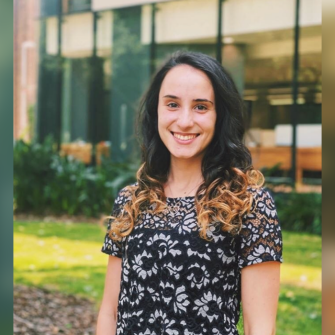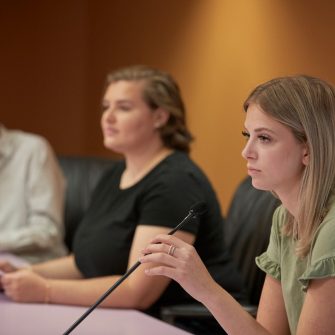Bachelor of Social Work (Honours) / Law
- Commencing Terms
- Term 1
- Duration
- 6.7 Year(s)
- Delivery Mode
- Face-to-face (includes blended)
- Campus
-
Kensington
- Codes
- UAC code 426070
- Program code 4787
-
2025 Indicative first year full fee
- $17,000*
-
2025 Indicative full fee to complete degree
- $114,000*
-
2025 Indicative first year full fee
- $53,000*
-
2025 Indicative full fee to complete degree
- $392,500*

UNSW Arts, Design & Architecture Info Evening
Wed 7 May, 6 - 7 PM AEST | Online
Hone your creativity skills and discover what you can achieve as a UNSW Arts, Design & Architecture student. Find out how we can equip your passions and creativity with the practical skills and knowledge to succeed. You'll learn about our degrees, career opportunities, admission pathways, scholarships and more.

UNSW is introducing a new academic calendar from 2028.
What does this mean for my studies? UNSW is moving to a new ‘flex-semester’ calendar.
- Overview
- Entry requirements
- What will I study?
- Future careers
- How to apply
- Fees & Scholarships
Overview
This degree is designed for students who are passionate about social justice and see the law as a driver for social change.
The Social Work (Honours) degree includes studies in social work practice, social and behavioural sciences, and contextual studies. The degree includes courses that build research skills, including research design and methodology, and you'll complete a piece of independent or directed research as part of the Honours requirement.
UNSW Law & Justice graduates have excellent analytical skills, a capacity for scholarly research, effective oral and written communication skills, and a commitment to personal and professional development, ethical practice and social responsibility.
Why study at UNSW?
Studying law opens the door to countless opportunities, inside and outside the legal profession. UNSW Law & Justice instils the values, skills and qualities you'll need to become a qualified legal practitioner with a strong sense of community and social justice. Employers seek our graduates for their critical thinking and analytical skills. We teach our students to think outside the box, so when it comes to your career, there will be many options available to you.
World-class Scholarship
Learn from Australia’s leader in progressive and rigorous legal education at UNSW Law & Justice, ranked #1 in Australia and #12 globally for law and legal studies (QS World University Rankings by Subject, 2025). Study at a Group of Eight (Go8) university that has the highest quality teaching among Australia’s research-intensive law schools.
Multiply Your Opportunities
At UNSW, you’ll study undergraduate law as part of a double degree. Be part of a diverse cohort of interdisciplinary thinkers that combine their passion for law and justice with expertise in other disciplines. Our graduates have applied their law degree to countless industries as critical thinkers and problem-solvers that bring the added perspective of a second specialisation.
Exclusive Career Support
Graduate career-ready with UNSW Law & Justice’s in-house careers service, dedicated to our students and alumni. The service includes a jobs board and a range of resources, presentations and workshops to maximise your employability.
Experiential Learning
Apply your knowledge from the classroom to industry experiences and experiential learning opportunities. You’ll have the chance through both of your degrees to gain for-credit practical experience through exchange and international courses, internships, clinics and competitions.
Global Student Opportunities
Gain global perspectives by studying other countries’ legal systems through overseas electives in China, the USA, Switzerland, India, Vanuatu and Chile. Or you may wish to immerse yourself abroad through student exchange at one of UNSW’s more than 300 exchange hosts across 38 countries.
End-to-end Legal Education
Prepare for legal practice all in one place. All law graduates in Australia must complete PLT to practise as a lawyer. UNSW’s PLT is the Graduate Diploma in Legal Professional Practice (GDLPP), so you can graduate from one place with all the qualifications you need to launch your legal career.
Want to see more from UNSW Law and Justice?
Entry requirements
UNSW is changing the admissions process to the Bachelor of Laws
2025 will be the last year we offer the Law Admission Test (LAT) for entry into our Bachelor of Laws programs. For more information including FAQs, eligibility and key dates, please visit our LAT page.
Additional Selection Criteria
UNSW is changing the admissions process to the Bachelor of Laws. 2025 will be the last year we offer the Law Admission Test for entry into our Bachelor of Laws programs.
While the LAT will be offered in 2025, the following conditions now apply:
- Only students seeking entry in 2026 should sit the LAT in 2025
- If you sit the LAT in 2025, your results will no longer be valid for two years
- Year 11 students who sat the LAT in 2024, your results remain valid this year and can be used for entry in 2026
- The Law Admission Test (LAT) will not be included in the entry requirements for students seeking entry in 2027 and beyond
For more information, including key dates, eligibility and FAQs, please visit our webpage.
Assumed knowledge
None
Adjustment Factors
We offer adjustment factor schemes that take into account a range of personal and educational disadvantages that may have affected your studies.
Educational Access Scheme (EAS)
Factors such as illness, financial hardship, language difficulties or attending a particular school can mean you don't always get the best possible marks in Years 11 and 12. If one of these situations applies to you, submit an application for the Educational Access Scheme (EAS) via UAC. Eligible students can receive between 1 and 10 points towards their chosen UNSW degree.
Admission pathways
Alternative Entry
Not everyone applies to university straight from high school. That’s why UNSW considers a range of qualifications, life experience and pathway programs for admission into our degrees. Find out what you’ll need to apply to UNSW, depending on where you’re at in life.
UNSW Internal Program Transfer (IPT)
Every year UNSW Law & Justice provides up to 100 places for students studying a non-law degree at UNSW to transfer into a Law double degree. Alternative entry through Internal Program Transfer (IPT) doesn’t require you to sit the LAT and providing you receive full credit for your first year of studies, it won’t take you any longer to complete a law double degree.
Credit Transfer Policy
If you've completed prior learning at another tertiary institution or in another UNSW degree, you may be eligible for a credit transfer. Find out more in the Credit Transfer Rules and Regulations.
English language requirements
You may be asked to provide evidence of your English proficiency to study at UNSW depending on your educational background and citizenship. English language skills are vitally important for coping with lectures, tutorials, assignments and examinations - this is why UNSW requires a minimum English language competency for enrolment.
If you’re completing an Australian Year 12 qualification (e.g. NSW HSC or equivalent), you do not need to provide anything extra to prove your proficiency. Your qualification will be used as evidence of your English proficiency.
If you do need to provide evidence of your English proficiency, this will be indicated in your application. You can prove this by providing evidence that you meet one or more of the following criteria:
- English language tests and university English courses
- Prior study in the medium of English
- Other qualifications
If you need to improve your English skills before you start your degree, UNSW College’s Academic English Programs are for you. The programs are suitable for various English levels and help you prepare for university studies and life in Australia.
For more details, visit the English Language Requirements page.
International direct entry
| Qualifications | Direct entry requirement |
|---|---|
|
International ATAR
|
92.0
|
| UNSW Foundation Studies GPA |
8.2
|
|
Great Britain General Certificate of Education (GCE A levels)
|
15.0
|
|
International Baccalaureate Diploma (IB)
|
36.0
|
|
Scholastic Aptitude Test (SAT) (after 2016)
|
1300.0
|
We do not accept secondary qualifications from this country. We may accept tertiary study results, please contact us for more information.
Please contact us for direct entry requirements.
Admission pathways
UNSW Global has university pathway programs that provide seamless transition to UNSW Sydney so you can achieve your academic and career goals.
UNSW Internal Program Transfer (IPT)
Every year UNSW Law & Justice provides up to 100 places for students studying a non-law degree at UNSW to transfer into a Law double degree. Alternative entry through Internal Program Transfer (IPT) doesn’t require you to sit the LAT and providing you receive full credit for your first year of studies, it won’t take you any longer to complete a law double degree.
Credit Transfer Policy
If you've completed prior learning at another tertiary institution or in another UNSW degree, you may be eligible for a credit transfer. Find out more in the Credit Transfer Rules and Regulations.
English language requirements
You may be asked to provide evidence of your English proficiency to study at UNSW depending on whether you are from an English-speaking background or non-English speaking background. English language skills are vitally important for coping with lectures, tutorials, assignments and examinations - this is why UNSW requires a minimum English language competency for enrolment.
If English is not your first language, you’ll need to provide proof of your English proficiency before you can be given an offer to study at UNSW. You can do this by providing evidence that you meet one or more of the following criteria:
- English language tests and university English courses
- Prior study in the medium of English
- Other qualifications
If you need to improve your English skills before you start your degree, UNSW College’s Academic English Programs are for you. The programs are suitable for various English levels and help you prepare for university studies and life in Australia.
For more details, visit the English Language Requirements page.
Check the specific English language requirements for this program
What will I study?
Program structure
The Bachelor of Social Work (Honours)/Law double degree program is 6.7 years full-time and consists of 52 courses (312 Units of Credit).
Two degrees doesn’t mean double the workload. Each year you’ll complete the same number of units as a single degree full-time study load, eight courses (48 UOC) across three terms. Our three-term calendar allows you the flexibility to tailor your schedule to suit your goals. With two three-course terms and one two-course term per year, you’ll have the time to focus on completing extra-curricular activities on campus or for-credit industry opportunities.
As part of your degree, you’ll undertake hands-on courses that integrate industry experience into your program. You’ll also participate in interactive teaching, group work, and a clinical component in which you’ll work with clients and lawyers at Kingsford Legal Centre (KLC), a fully functioning legal centre that operates out of the UNSW Law & Justice Building.
Full program structure
Future careers
Study Law as a double degree to be a well-rounded graduate prepared for a career practising law or applying your legal mind and skills to other industries. UNSW Law & Justice is ranked #1 in Australia and #12 globally for employer reputation in law and legal studies (QS World University Rankings by Subject, 2025). That’s because we teach our students to think outside the box, so when it comes to your career, employers will seek you out for your critical thinking, persuasive communication, creative problem solving and analytical skills.
End-to-end legal Education at UNSW
Completing a Bachelor of Laws (LLB) at UNSW will take you a step towards becoming a lawyer, followed by Practical Legal Training (PLT). All law graduates in Australia must complete PLT to practise as a lawyer. UNSW’s PLT is the Graduate Diploma in Legal Professional Practice (GDLPP), so you can graduate from one place with all the qualifications you need to launch your legal career.
Step 1 – Complete your Bachelor of Laws (LLB).
Step 2 – Complete your GDLPP at UNSW.
Step 3 – Apply to the Supreme Court for admission to practice.
UNSW Law & Justice students also have the opportunity to fast track their entry to the legal profession by completing their PLT while finishing their undergraduate degree.
Potential careers
- Government adviser
- Public policy adviser
- Consumer protection lawyer
- Child and family law specialist
- Human rights lawyer
Accreditation
- Legal Profession Admission Board (NSW)
- Australian Association of Social Workers (AASW)
How to apply
Applications for undergraduate study from domestic students* are processed by the Universities Admissions Centre (UAC).
Visit the Apply section of the UAC website and you can nominate up to five degrees in order of preference, with the first being your most desired degree and university.
When applying for UNSW Bachelor of Social Work (Honours)/Law through UAC, you’ll need your Law Admission Test (LAT) registration number to ensure your LAT results are considered in the admission process. The LAT registration opens in May and is held in September each year. Keep up to date with LAT key dates and requirements here.
On-time applications for admission usually close at the end of September each year for Term 1 admission. Late applications can be submitted, but a late fee will apply. For study starting in Term 1, most offers are made in December and January.
Visit the UAC website for key dates for admission outside of Term 1.
Find out more information on how to apply here.
*Australian citizens, Australian permanent residents, Australian permanent humanitarian visa holders and New Zealand citizens
Ready to start your application?
For most international students, applications are submitted via our Apply Online service. We encourage you to submit your completed application as early as possible to ensure it will be processed in time for your preferred term.
Some high-demand programs with limited places, may have an earlier application deadline or may have an earlier commencement date. For more information visit our international applicant information page.
*If you are an international student studying an Australian qualification, go to the Universities Admission Centre (UAC), opens in a new window for application and UAC key dates. Note: If you are under 18 years of age, you need to make special arrangements. Read more.
Ready to start your application?
Fees & Scholarships
Commonwealth Supported Place multiple Student Contribution Bands may apply for this double degree. See single degrees for the applicable fee bands.*The student contribution for a Commonwealth Supported Place is an indication only of the amount payable in Year 1 based on a standard full-time load of 48 credit points (1.0 EFTSL). The actual student contribution you will be liable for depends on your individual program of study and the calendar year in which you enrol. Actual fees are calculated upon enrolment. Student contribution amounts are subject to annual review by the University and may increase each year during your studies (subject to caps determined by the Australian Government), effective at the start of each calendar year. The indicative fees listed here are based on an estimated average and are for tuition only other fees and charges are not included.
*Fees are subject to annual review by the University and may increase annually, with the new fees effective from the start of each calendar year. The indicative fees listed here are based on an estimated average and are for tuition only, other fees and charges are not included. The amount you pay will vary depending on the calendar year to enrol, the courses you select and whether your study load is more or less than 1 Equivalent Full Time Student Load (8 courses per year).
Indicative fees are a guide for comparison only based on current conditions and available data. You should not rely on indicative fees. More information on fees can be found at the UNSW fees website.
Indicative fees to complete the program have been calculated based on a percentage increase for every year of the program. Fee increases are assessed annually and may exceed the indicative figures listed here.
Indicative fees to complete the program include tuition plus an estimate of study-related costs of approximately $1,000 per year. To find out more about other costs, visit UNSW International.
Scholarships
At UNSW, we award over $83 million in scholarships each year. We pride ourselves on rewarding excellence and making university accessible to students from all walks of life. Whether you’re a domestic or international student, our range of scholarships, prizes and awards can support your journey.

QS World University Rankings, 2025

AFR Top100 Future Leaders Awards, 2020-2025

#1 Australian uni attended by start-up founders





